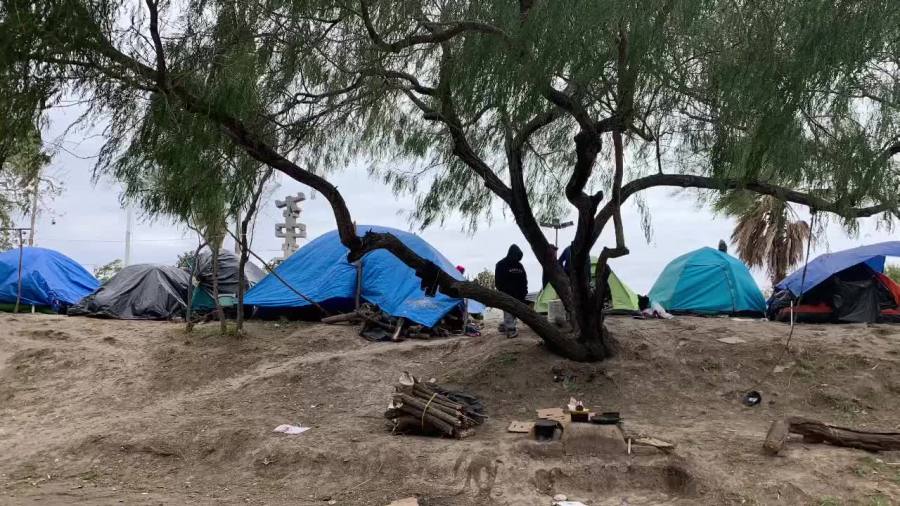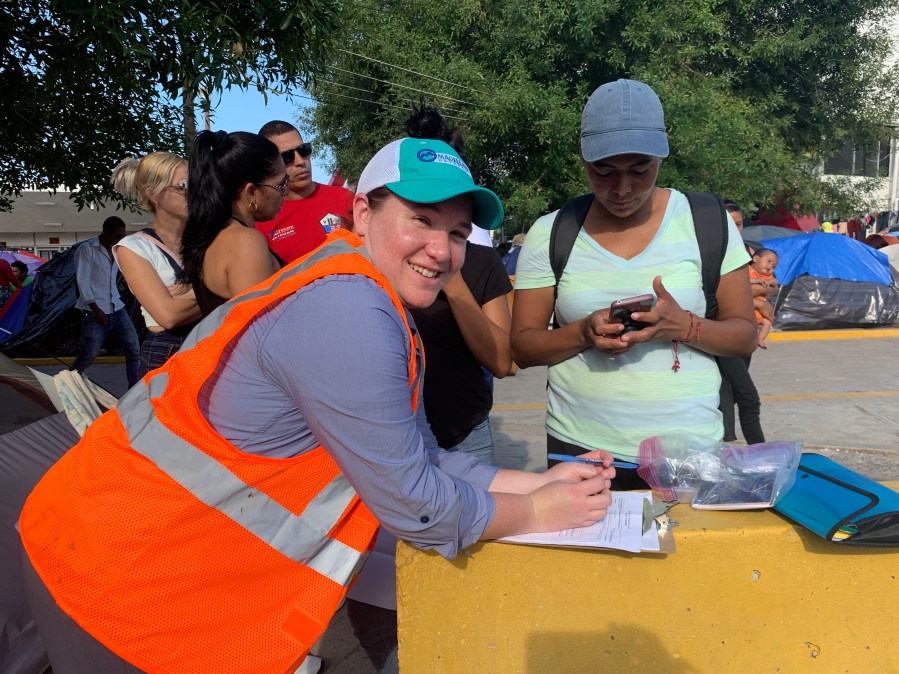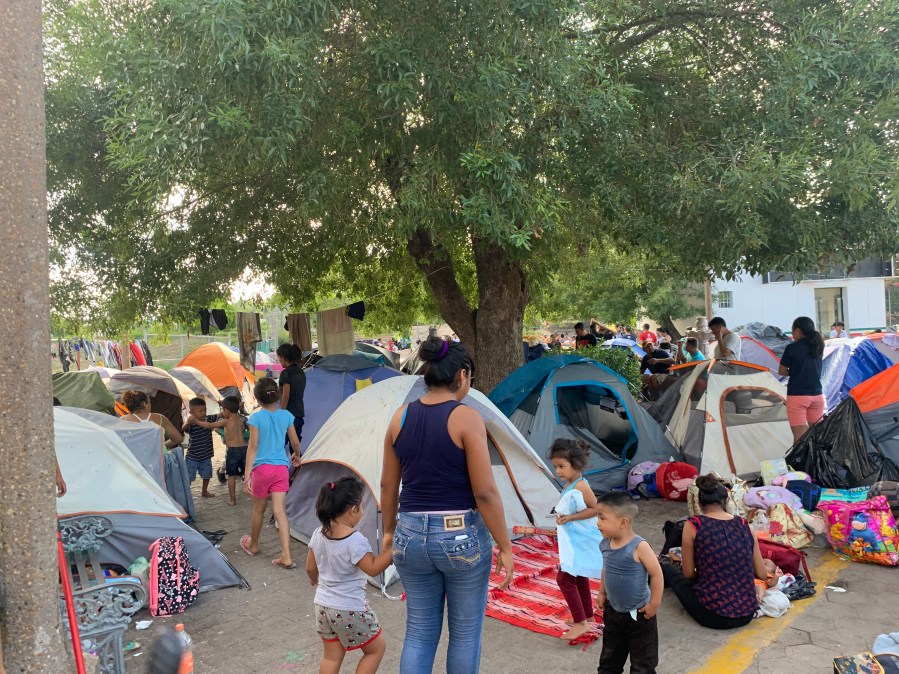McALLEN, Texas (Border Report) — Without first alerting federal authorities on either side of the border, two U.S. congressmen crossed into Matamoros, Mexico, on Monday, to witness first-hand what they called “deteriorating” conditions at a refugee camp where 2,000 asylum-seekers live.
After viewing the camp for a couple of hours, U.S. Reps. Filemon Vela, D-Texas, and Bennie Thompson, D-Mississippi, told Border Report it was “worse” than camps they have visited in Somalia and Syria.
In a phone interview with Border Report immediately after returning to Brownsville, both congressmen said they have been to refugee camps elsewhere in the world that were far better-run and supported than what is happening just across the border from Texas.

“There’s no doubt there are deteriorating conditions,” said Vela, whose district includes Brownsville. “We’re seeing it get worse and worse and worse.”
“I’ve known all along it was a disaster but now it’s real clear,” he said. “I have been to the Syrian refugee camps in Jordan and I’m not exaggerating when I say the conditions of the camp in Matamoros are worse than the camps in Jordan.”
Vela said there is no proper sewage or showering system, and there is no way for these migrants to get regular meals. Most of the migrants bathe in the filthy Rio Grande and receive meals from volunteers from the United States, not Mexican authorities, as is outlined under the Migrant Protection Protocols Program (MPP), also known as “Remain in Mexico,” that returns the asylum seekers to Mexico to await their court hearings.
I have been to the Syrian refugee camps in Jordan and I’m not exaggerating when I say the conditions of the camp in Matamoros are worse than the camps in Jordan.”
U.S. Rep. Filemon Vela, D-Texas
Thompson, who is chairman of the House Homeland Security Committee, said he was astounded by what he saw Monday during his first visit to the camp. “It’s a depressing situation. It has serious health and sanitary issues. There are potential security issues and just a total breakdown of any infrastructure for those individuals living in tents,” he said.

Thompson last week was part of a two-hour hearing of the House Homeland Security Subcommittee on Border Security on the growing tent city in Matamoros. He said that a former commissioner for U.S. Customs and Border Protection testified that the conditions were not bad and that Mexican authorities are helping the asylum-seekers.
But Thompson said he saw none of that on Monday morning as he and Vela helped to feed 600 refugees with a group of volunteers from the nonprofit organization Team Brownsville who go daily to aid the migrants. And he said it was sad to watch as they ran out of beans and migas (an egg dish,)
“We heard from a Republican witness, former CBP commissioner that ‘everything was fine and illegal border crossings were down.’ He said that the people being detained ‘are being treated humanely,’ there were no issues around health and sanitation, and that the Mexican government was a ‘full partner in this redefinition of policy,’ and I have yet to see any involvement by the Mexican government of note,” Thompson said. “The Trump administration is manufacturing a crisis at the border because of their reinterpretation of the policy.”
It’s a depressing situation. It has serious health and sanitary issues. There are potential security issues and just a total breakdown of any infrastructure for those individuals living in tents.”
U.S. Rep. Bennie Thompson, D-Miss.
The Trump administration began implementing MPP in South Texas on July 17. After that date, most asylum-seekers who were apprehended in the Rio Grande Valley Sector by U.S. Border Patrol, have been sent over the Gateway International Bridge to wait for their asylum proceedings in Mexico. Most do not have money for hotels or apartments and are living in this makeshift tent city that now sprawls several blocks.
Migrants are vulnerable to rapes, kidnapping, extortion and beatings at the camp, mostly by drug cartel operatives who control the region, according to a complaint the ACLU filed with the Inspector General of the U.S. Department of Homeland Security.

On Nov. 1, Matamoros officials with a local child services agency, the Desarrollo Integral de la Familia (or DIF,) came to the camp with a bus and tried to round up the children living in the tents saying the temperatures were too cold and the conditions too harsh for them to continue living there. But the families held fast to their children and refused to leave for a shelter further in the interior.
Read a Border Report story on the attempted round up.
Thompson said what he saw Monday echoed what advocates for asylum-seekers testified in Washington, D.C., before his subcommittee on Nov. 19.

Erin Thorn Vela, a staff lawyer for the Texas Civil Rights Project, testified that “the horrors in Matamoros are almost endless.” Thorn Vela said she has provided over 200 hours of pro-bono legal aid to the migrants at the camp.
“Anyone can target asylum-seekers today with impunity and no government will care. This program’s design puts people in life-threatening conditions,” Thorn Vela told lawmakers on Capitol Hill.
Giving up their children
The Washington Post reported Friday that when temperatures recently dropped into the 30s, several asylum-seekers sent their children over the bridge as unaccompanied minors to get them out of the cold. The article said many of the children suffered from frostbite and upper respiratory illnesses from months living in tents and that the parents made this decision as a last desperate measure to save them from further abuses. The Post reported that in the past three weeks 50 children have crossed the bridge without parents.
The United States has long had a tradition of accepting unaccompanied youth as asylum-seekers who are then sent to the Office of Refugee Resettlement, which is under the U.S. Department of Health and Human Services. Many of these children are sent to detention facilities located throughout the country.
Largest refugee camp on US border
The Post article declared the Matamoros tent city “the largest refugee camp on the U.S. border.”
On several occasions, Border Report has visited the camp and written about many of the migrants living there.

On Nov. 1, Yamali Flores, of Honduras, who has been living in the camp since August with her husband and three children, ages 7, 9 and 13, begged that the United States do something to help them.
“The United States needs to help from the other side because we don’t want to be in Mexico. We need protection,” she said in Spanish. “We don’t want to be here. This isn’t our country. It’s very dangerous here for our children. We need help.”

Chad Wolf, acting secretary for the Department of Homeland Security, visited South Texas last week and praised MPP, calling it “a game changer” that is helping to reduce illegal immigration greatly on the Southwest border. Wolf said it was “changing the dynamic at the border” by discouraging human trafficking.
But Vela said that unless you see, smell and experience the camp in person, the horrors of it are lost, especially as the nation is consumed with the ongoing impeachment hearings.
“The problem is those stories are getting swallowed up by all the impeachment news,” Vela said. “I’m at the point where we’re taking one step at a time. We can’t fix the MPP policy, so let’s see what we can do about improving shelter conditions.”
Vela met with the Mexican ambassador las week and has been involved with ongoing talks with Mexican nongovernmental organizations that are also helping to aid the migrants, he said.
Thompson said he plans to call another Homeland Security Committee hearing on the issue, most like during the first week of January.
In the meantime, Vela worries about pregnant women and barefoot children living on the streets in Matamoros, a city that the U.S. State Department has deemed too dangerous for Americans to travel there.
Helen Perry, a nurse practitioner from Florida who was volunteering earlier this month in Matamoros with the nonprofit Global Response Management, told Border Report on Nov. 1, that they had been actively trying to locate a baby born in the camp recently during heavy rains. One organization had put the family up in a hotel for a couple of nights when the baby was just 4 days old and the rains were quite heavy, and when the cold returned, they were trying to find them but were out of luck.
Perry cited Maslow’s Hierarchy of Needs as a basis for how humans seek safety and refuge as a top priority for survival, which these asylum-seekers did when they first founded this camp — located on relatively safe federal lands controlled by the Mexican military (not drug cartels) and just across from the United States.
The migrants have said they are afraid to leave this area and venture further into Matamoros, a city of 450,000 where the Gulf Cartel has a stronghold on its residents.
“These are not people choosing to live in these conditions, these are people who are being placed in these conditions because of the safety situation in Matamoros,” Perry said. “We could be working to improve the conditions so they can stay in safe places.”
















